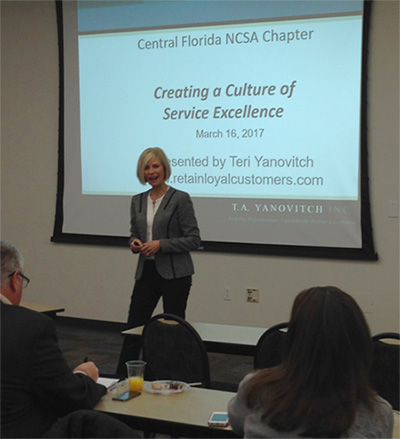» back to Chapter Updates Archives
 For our NCSACFL chapter meeting in March, we were treated to a presentation by customer experience author, speaker and consultant, Teri Yanovitch. She started by sharing her career journey—from an auspicious beginning as a can-can dancer at the Diamond Horseshoe at Walt Disney World (her dream job at the time) to present. Teri spoke to some of the important take-aways she had from her time at Hertz, most notably that “a car is a car is a car” but the key differentiator is in the value of the customer experience. Later she was introduced to the book “Quality is Free” written by Philip Crosby, who would eventually become her mentor and employer. In it, Crosby wrote of the optimal level of quality and how the lack of quality costs businesses money.
For our NCSACFL chapter meeting in March, we were treated to a presentation by customer experience author, speaker and consultant, Teri Yanovitch. She started by sharing her career journey—from an auspicious beginning as a can-can dancer at the Diamond Horseshoe at Walt Disney World (her dream job at the time) to present. Teri spoke to some of the important take-aways she had from her time at Hertz, most notably that “a car is a car is a car” but the key differentiator is in the value of the customer experience. Later she was introduced to the book “Quality is Free” written by Philip Crosby, who would eventually become her mentor and employer. In it, Crosby wrote of the optimal level of quality and how the lack of quality costs businesses money.
Teri went on to discuss how to go about building a business the delivers service excellence. She talked about the importance of creating a culture in which employees strive to do the job right the first time, where they are living and representing the brand and they do the things they do even when nobody is looking. Employee engagement is critical to service excellence. With excellent service comes “happy customers,” who then generate referrals, remain loyal to the brand/business which, in turn, are a guarantee of repeat business.
There is one aspect that organizations often overlook when defining their culture and that is, “What is our higher purpose?” The elements of culture (ie: common beliefs, behaviors, language, artifacts, traditions, folklore) are fairly easy to identify. The “higher purpose” speaks to the emotional connection with the customer. It’s that almost intangible quality that you will not find in most company’s mission or value statement. She gave the example of Disney’s higher purpose of “happiness.” In a contact center, it comes down to “how you want the customer to feel at the end of the call.” Teri offered up the analogy of the “tip of iceberg” as being what you want customers to see, but how they feel as what lies beneath. Once you have established this, then you can create service standards, which will provide the criteria for making service decisions that help you attain that higher purpose—and with consistency across the organization.
She suggested further that if you want to establish and foster a high-level service excellence team, there are a few ingredients that are a must:
Teri ended with a favorite quote from Aristotle, “Excellence is not an act, it's a habit.”
Thank you Teri and UCF for hosting the meeting!